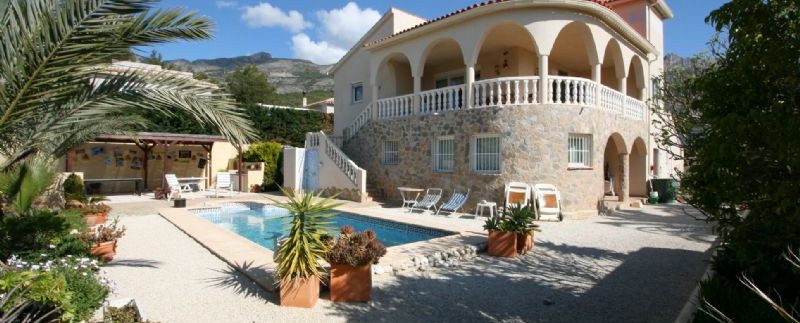
Whether it’s a holiday resort on Majorca or the beach house on the French Atlantic coast – many Germans dream of owning a holiday home abroad. Cottages and apartments are particularly popular in warmer countries such as Spain or Italy, but also in cold Scandinavia. If you have this wish too, it makes sense to gather enough information in advance.
If you want to buy a property abroad as cheaply as possible, there are currently good opportunities. Especially in the south of Europe, properties are currently comparatively cheap. Due to the ongoing euro crisis, a number of homeowners sell their properties for mostly five-digit amounts.
In addition, you can currently get real estate loans for relatively low interest rates – to avoid too high a risk, however, at least half of the price should be funded from your own resources.
These advantages offer real estate abroad
In contrast to the home in Germany, real estate abroad has some advantages:
- In countries like Spain, Italy and Sweden, the properties are extremely cheap
- Often the taxation is cheaper than in Germany
- Foreign real estate can be rented out if you are not there yourself
- The rental especially in popular holiday regions usually yields high returns
However, before you buy an object abroad, you should take into account not only the advantages but also the risks – in other words, inform yourself beforehand in detail about buying a house in other countries.
Before buying: Find the right object
If you would like to realize the dream of your own holiday home, you should first find the suitable object and inform yourself about the taxation and the legal regulations. You should also find out if it is even allowed for foreigners in the respective states to purchase a property.
Taxation abroad
Take into account that the taxation in the desired countries can be different than in Germany. The tax types differ in the individual states:
| Belgium |
|
|---|---|
| Denmark |
|
| France |
|
| Greece |
|
| Italy |
|
| Netherlands |
|
| Austria |
|
| Switzerland |
|
| Spain |
|
Checkout abroad
In order to handle the purchase of your property abroad, you should definitely hire a notary and an interpreter – although this is not common in some countries, but secures you against pitfalls and misunderstandings.
Verbal commitment
In the southern countries, an oral pledge is often enough to commit to the purchase of real estate. So in Spain, Italy or Portugal, you should be careful not to say it orally before you are sure.
Only conclude your contract of sale in the presence of a notary and seal it with a notary’s signature. In addition, have a reputable interpreter translate for you so that there are no misunderstandings. This should also be present in advance during the purchase negotiations.
Bilingual contract facilitates verification
It makes sense to have the purchase contract bilingual. In this way, you can check all aspects of the real estate purchase yourself before signing. But make sure that even the fine print is translated for you.
Where can I not buy real estate as an EU citizen?
Not every EU citizen has the opportunity to easily buy a property. In Spain, for example, foreigners enjoy the same rights as the locals – so there are no restrictions on buying a home. However, this is not the case in all countries:
- Switzerland
In Switzerland, a license from the relevant cantonal authority is required, unless you are a frontier worker with a desired secondary residence or a foreigner with a residence permit. It is forbidden to buy an object for rent, ie as a pure investment. - Austria
In Austria, a work permit is required, which you will receive from the Foreigners Land Transfer Authority. - Netherlands
Although EU foreigners can usually buy real estate without any problems, they are often only allowed to use them as a primary residence and not as a holiday home. Holiday homes of holiday rental companies may also not be inhabited throughout the year. - Denmark
A summer house in Denmark may only be bought by persons who have lived in that country for at least five years. However, it does not matter if the principal place of residence is in another country at the time of the acquisition of the real estate.
Advice on the purchase of real estate abroad
Before you start building finance for your desired foreign property, you can contact the German Property Rights Association. The association offers you individual legal advice, especially for buying a home in France, Italy and Spain.
It is important that you do not make the purchase of the property alone, but seek advice. So you play it safe that the acquisition of your desired property runs as smoothly as possible.
Where can I find suitable properties?
The Internet offers a wide range of real estate and brokerage portals for most countries, where available properties can be viewed. Here you have the opportunity to quickly and easily look at different houses or apartments and compare them with each other. But even local newspapers offer the opportunity to search for a suitable property that may not have been posted on the Internet.
Check costs
Due to the ongoing euro crisis, there are some differences in house purchase costs in different countries. Especially in Spain and Italy, where the weakened economy has left its mark, small cottages and apartments in peripheral areas can often be bought for a medium to high five-digit amount. For example, near Valencia on the Spanish east coast, you can buy a small terraced house for around 55,000 euros.
Prices in different regions
In Italy and France in particular, but also in Spain, purchase prices are heavily dependent on the different regions. Especially in the Balearic Islands, larger properties can increase prices significantly – for around 350 square meters near Palma de Mallorca will quickly be about 2.5 million euros due. In Austria too, the price depends heavily on the region.
In Denmark, the real estate is similarly cheap: In South Jutland, for example, you can buy a 200 square meter, new property for about 500,000 euros. Prices are even lower in Turkey – as long as the desired property is not a luxury villa.
The following costs may apply additionally
In addition to the general home purchase costs – ie the purchase price of the property and the associated fees – may also incur additional costs:
- Travel expenses for the visit
Be sure to plan a visit to any desired property so as not to fall for cheaters. In particular, if your desired objects are located in different regions or even countries, this can result in high travel costs. These are to be included in every case. - Taxes for home purchase and administration
Keep in mind that different taxes vary in different countries. In the chapter “What does taxation abroad look like?” We have compiled a few examples. - Translation of documents
If you do not speak the language of the respective country, it is absolutely necessary to book an interpreter. He will not only help you with the negotiations and advise you on all legal steps, he can also translate the necessary documents for you. It’s best to find out in advance how much you will pay for it. - Cost of managing the object
Future property owners should take into account that costs are incurred even after the purchase of the property – for example, for the care of the garden and pool, for heating and electricity costs or for regular repairs. If the property is rented, administrative costs must also be reckoned with.
Also, keep in mind that these relative costs may vary, depending on whether you choose an apartment or a home. Often, apartments are cheaper because they rarely have a plot that needs to be maintained. So here, for example, costs for the care of the garden accounts. However, depending on the size of the property, a home can be extremely expensive.
Tour of real estate abroad
Also for real estate abroad: Never sign a contract before you have seen the object. A visit on site should therefore be carried out unconditionally – even if the trips can be a bit more expensive. Only in this way you can recognize flaws in the property and take a close look at the house or apartment.
Beware of object selection
Do not decide on an object just because of photos. Because especially when buying real estate from a distance you can fall victim to fraudsters who want to transfer you in this way a defective property. It may even happen that the object does not exist. A visit is therefore absolutely necessary.
During the visit you should pay particular attention to these aspects:
- It would be best to be accompanied by an expert who can draw your attention to various construction defects.
- Inquire about the local building law and let us know if rebuilding plans are feasible.
- Find out if the property is a legal building.
- Clarify whether the property is mortgage-free and how the ownership structure.
Buying the property: what to look for?
It makes sense to finance the foreign property with the help of a real estate loan. However, as with properties in Germany, debt financing should not exceed 50 percent of the total purchase price. With regard to own funds, it should also be noted that enough money should be set aside for any repairs.
Financing: taking out credit in Germany or abroad?
Foreign properties are generally regarded as risky for German banks, as they are far from home. In addition, they are not inhabited all year round and are usually subject to foreign law. So it is often difficult to obtain financing from a German financial institution.
Often, such a credit request is rejected. However, if accepted, some banks require collateralization on a domestic property, such as properties in Greece. Other banks are demanding an interest premium to minimize their risk.
Financing the property through foreign banks
The conclusion of a financing abroad, however, involves risks for the buyer: The legal situation is different than in Germany, the terms and conditions may vary greatly.
Take into account that here interest and fees can be higher. If you buy an object outside the eurozone, the loan may also be subject to currency fluctuations, which may make house purchases more expensive.
When choosing the right financing, note the following:
- If you want to finance your property through foreign banks, you should have the appropriate language skills.
- Financing by foreign banks often requires ancillary financing costs.
- Anyone who already has their own home in Germany can use this as collateral for German banks and thus increase their credit opportunities.
Foreign real estate in the German tax return
Depending on the country, there are different regulations regarding the German taxation of foreign real estate. It often has to be decided on a case-by-case basis how the German tax authorities can act.
However, there is one uniform rule: if the foreign property is rented out and incomes are incurred, it will be taxed with income tax. Here, both profits and losses have to be considered. As a result, they must also be considered in the German tax return.
Even in the respective country, where the property is rented, the property owner is often regarded as a limited taxable. This means that his rental income is also subject to income tax there.
With regard to property tax and real estate transfer tax, objects located abroad can only be taxed in the country in which they are located.
Management of the purchased property
Before you buy a foreign property, you should definitely take into account the costs of the administration. Because these are ongoing costs that have to be paid constantly. These include, for example:
- Cost of cleaning
- Cost of maintaining the property
- Additional costs such as heating, water and electricity costs
- Costs of a reputable steward who takes care of the rental
- Costs for a building insurance and a supplementary insurance against natural damages
What else needs to be considered?
Many use the property abroad not only as a holiday home, but also as a retreat in old age. It is important to check before you buy, whether it is even possible for you to live permanently in the desired country. In many countries, if you wish to stay in the country for more than 90 days, a residence permit must be obtained.
Residence permit for non-EU countries
In a number of countries outside the EU, a residence permit is required as soon as you want to buy a property there. Often the length of stay is limited.
In many countries within Europe, such as Switzerland, Germans can buy and rent a property without having a residence permit.

 Deutsch
Deutsch Español
Español
